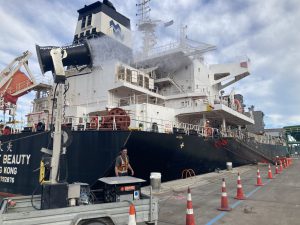
Fog canon trials as part of LPC’s mitigiation techniques for dusty bulk products.
A recent bulk cargo operation was all hands on deck as teams across the Port trialed new mitigation techniques for dusty products.
LPC holds resource consents for several activities and is committed to exceeding consent requirements where possible.
Over the last eighteen months, and following issues highlighted in one shipment in April, Environment Canterbury (ECan) and the harbour communities have called for improved environmental measures around dust management.
LPC has partnered with customers, port operators and regulators to ensure operations don’t impact the environment or community and uphold our commitment to being a good neighbour.
LPC Environment Business Partner Kirsty Brennan says the team have been working on several improvement actions for the bulk cargo operations, some that are quick to implement, and while others are longer term projects.
There are three areas that LPC is currently focused on.
Product Classification
LPC has been working with experts to categorise the range of products that come through the Port about their dustiness level.
“There are multiple factors that contribute to this, like particle size, weight, density, and moisture content,” says Kirsty.
Detailed classification allows LPC to implement mitigation measures to suit the product type.
Real-time measuring
Later this year, LPC will monitor dust in real-time to assess the amount of dust generated from the different activities in the inner harbour.
LPC will be able to better understand the effects of different weather patterns and the effectiveness of our mitigation measures.
Infrastructure
Upgrading the infrastructure offers both short- and long-term solutions.
LPC will continue to look at systems and processes used to import products, such as our hoppers. Large-scale modifications will take time, and LPC has started researching what best practices could look like for bulk cargo transfers.
LPC is implementing immediate changes to our existing hoppers, improving the misting system and investigating the use of fog canons. Similar to snow canons on ski fields, they spray mist that captures dust particles, dropping them over the working area and stopping their transportation in the air.
“It’s all a balance, as while water is the leading dust suppressant tool, too much water in the product can affect its quality or create runoff issues.”
LPC will provide further updates on the trials.